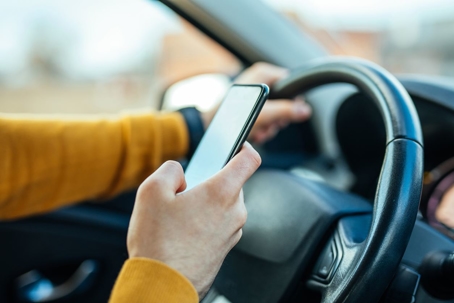Distracted driving is a huge problem, causing approximately 25% of all U.S. car crashes. With hundreds of thousands of people injured each year, it’s critical that we all do our part to ignore distractions and stay focused at the wheel. To help you avoid a serious crash, we’ve put together these 10 tips to prevent distracted driving.
10. Do Not Disturb
Your phone is arguably the single greatest distraction in your car. Even if you can ignore the temptation to look at an incoming notification, you’ll probably start thinking about what the message could be, which is a cognitive distraction.
The best way to prevent these distractions is to put your phone in do not disturb mode. This will prevent you from receiving notification pings, meaning you’re less likely to worry and more likely to focus on the road.
9. No Voice Dictation
Voice dictation might seem like a safe texting alternative, but it actually puts you at risk. Drivers who use voice dictation are just as likely to be in a crash as those who text manually. That’s because the mental strain of writing a message in your mind is just as taxing as texting with your hands.
8. Get Situated
Before starting your drive, make sure everything you need is in order. Set your GPS, adjust your mirrors, and take care of music and air before shifting out of park. Each of these is a manual distraction, and they can quickly add up and put you at risk of losing focus.
7. Clean Your Car
As we previously discussed, a messy car is one of the more insidious “hidden distractions.” When you’re worried about picking up trash in your vehicle or wonder whether your glass bottles in the back have cracked yet, you’re creating a cognitive distraction.
The best thing you can do to prevent distractions caused by clutter is to periodically clean out your car and collect trash whenever you stop to refuel.
6. Don’t Eat and Drive
Eating and driving is one of those “triple threat’ driving distractions that usually goes under the radar. We feel more confident about eating because it’s something we do every day, but that false sense of security is exactly what makes this so dangerous.
Every time you eat and drive, you’re facing the manual distraction of putting it into your mouth, the visual distraction of reaching for the food and making sure you don’t spill, and the (most importantly) the cognitive distraction of tasting the food. Each of these are distracting on their own, but when combined, those who eat and drive are typically driving by reflex, not sense.
5. Pull Over
If you need to answer a call, or eat, or pick up a rolling item, it’s best you find a safe place to pull over. Rest stops and text stops are becoming more common across the country, and it’s never a bad idea to pull over and stretch. It might even help you refocus and fight driver fatigue.
4. Change the Radio
Generally, your favorite music makes you more likely to be in a crash, especially if you’re prone to singing along. Instead of listening to fast tempo music, consider switching to easy listening or talk radio. Drivers who listen to low-tempo music or ambient sounds usually have better reaction times than other drivers.
3. Quiet Passengers
If your passengers are too loud, you should assert yourself and tell them to quiet down. Each passenger talking is a cognitive distraction that draws your focus away from the road. This is especially dangerous when you have small children who are prone to screaming, as you might instinctively look back to see what’s wrong.
2. Prevent Drowsy Driving
If you’re feeling driver fatigue, pulling over is the best thing you can do. Trying to fight it to get a few more miles in will only increase your chances of falling asleep at the wheel.
Thankfully, American highways are full of rest stops and truck stops where you can get out, stretch your legs, and get something to eat. If you feel like you can’t drive any further, you may want to take a nap at the rest stop until you’re safe to drive again.
1. Start Counting
If all else fails or if you find yourself especially prone to cognitive distractions (like daydreaming), try counting to refocus yourself. Counting lines on the road can be a great way to keep your mental focus on the road and the positioning of the other cars while also keeping your eyes where they need to be.
Next time you’re driving and you find yourself thinking about work or what you’ll have for lunch, recognize that this is a distraction and that you have the power to reign in your focus and put it back on the task at hand.
If you or someone you love were seriously injured by a distracted driver, we can fight for you. If you’d like an experienced Connecticut accident attorney from RisCassi & Davis, P.C. to evaluate your case, don’t hesitate to call us at (860) 245-2412 or send us an email!

